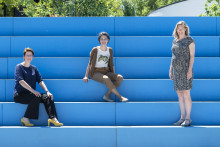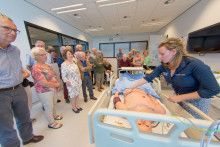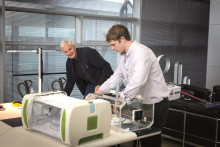What is each pillar responsible for?
Telma: ‘Our team assists researchers with funding acquisition. To acquire competitive funding, researchers are asked to write down their ideas on how to achieve certain solutions, but this process is complex. That is where the Grants Office comes in. We call ourselves the architects of calls for funding. We understand funding and we try to bring this knowledge to researchers, helping them develop proposals. Next to that, we would like to work with the organization, the management, on setting up a funding acquisition strategy for the future. We also promote training, preparing the community in skills needed to get funds. Everyone in all stages of their career can count on us for the knowledge on how to produce the best competitive proposal.’
Three SBD Pillars
Strategic Business Development consists of three pillars:
- Grants Office, lead by Telma Esteves
‘We understand funding and we try to bring this knowledge to researchers, helping them develop proposals’
- Impact Development, headed by Janneke Hoedemaekers
‘We support researchers and management to set up larger public-private partnerships’
- Project Management Office, supervised by Jorien van Loon
‘We support researchers whenever they are coordinating larger projects’
Janneke: ‘This is a nice bridge to impact development. As Telma indicated, these calls and funding schemes are highly competitive and often require collaboration, so consortia need to be formed. Within the Impact Development pillar, we support researchers and management to develop larger multidisciplinary public-private partnerships. This can ensure us higher success rates in these calls and improves the UT visibility and reputation. While the Grants Office has knowledge on national and European instruments, we help researchers build and maintain these larger relations and to develop propositions. We try to align the roadmaps of the University of Twente and the external organizations, which can be companies but also NGOs and hospitals. It comes down to more than just research, but also education and talent development. We try to connect the activities and challenges of the organization to the UT, and vice versa.’
Jorien: ‘And this is a nice introduction to what we do at Project Management Office (PMO). When these proposals or projects have been granted, that is when we come in. We support researchers whenever they are coordinating larger projects. We all know the workload of researchers is really high and we would like them to be able to focus on their own expertise and research topic. They are the best in what they do. When you have a large research project, there are so many other things coming at you. We will take care of that. We will take care of all the parts researchers are usually not fans of. While doing these things, we ensure the proper implementation of the proposal as well. If a project is not properly implemented, the funding agency may reduce the final grant and the UT may actually lose money. For us it is the end of the chain: we are securing the funding and the academic reputation of the UT as well. This will lead to more proposals granted and better relationships with partners.’
With what questions or a goal in mind should a researcher contact each of you?
Telma: ‘Ultimately we hope they contact SBD, because they see the value of large integrated approach to funding. It is ultimately about that. It is about making research possible and real - and making the best plan possible. It can be a researcher who sees potential impact in an idea, but is not sure where to take it. We can assist in the ideation and working together on definition of the potential impact. We need to stress that we also need a proactive community; we don’t just come up with opportunities ourselves. Yes, we do trend watching, but we always need critical mass and collaborative will from the community.’
Janneke: ‘We help people define a pathway on how to get something rolling. We help make connections – with businesses, funding schemes or even just internally with scientists at the UT who have worked on the topic in the past.’
Does that mean a researcher can contact you at any point with any initiative?
Jorien: ‘Yes, we can help across the entire chain: ideation, securing funding, helping get contracts. The help can also be quite practical during projects, such as writing deliverables, organizing consortium meetings. We also function as a sort of a helpdesk. All of us get researchers who have questions. There are many practical questions that will cost researchers a lot of time if they have to figure it out themselves. Now they can give us a call and their problem may be solved easily.’
‘We function as a sort of a helpdesk. We can help across the entire chain: ideation, securing funding, helping get contracts’
Telma: ‘We welcome any request, but we are also clear on our possible contributions. We focus on strategic priorities of the university. As Janneke said, we also connect internally because many requests can be addressed by the Faculties. We have good relations with other departments and we collaborate where suitable.’
Janneke: ‘Grants office and Project Management Office are the links to the internal structure, the world of the Faculties and the support there. At Impact Development, we have more focus to the external world, how are companies organized, what are the networks where businesses connect and what do they expect from universities. We often get approached with questions such as: Artificial Intelligence is now a relevant theme, how can I connect to it? We then make the translation to the initiatives we support and our partners. Overall, as a team, SBD strives to work as a single point of access to researchers and our partners.’







